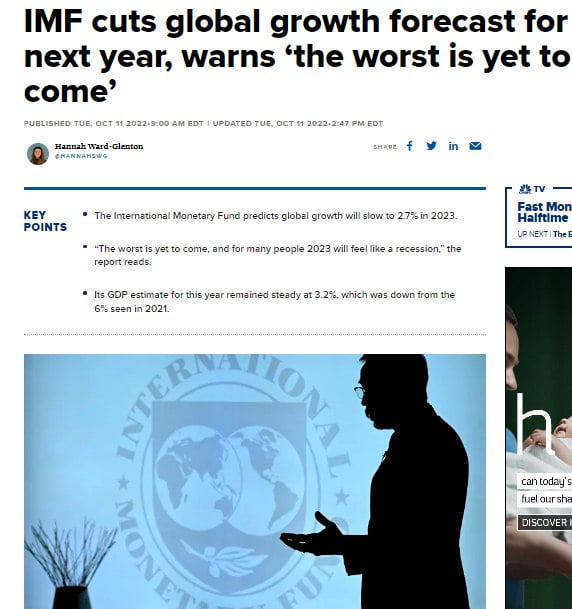According to the report issued by the IMF policymakers worldwide are dealing with an “unusually challenging financial stability environment ” in which additional shocks “may trigger market illiquidity disorderly sell-offs or distress.”
Speaking at the 2022 Annual Meetings of the International Monetary Fund and the World Bank Group the World Bank’s managing director of operations Axel Van Trotsenburg echoed the same sentiment:
On Tuesday 11thOctober he told CNBC’s Geoff Cutmore “We see extreme poverty again increasing. … The number of people living on $7 … That’s 47% of the world population [who are living] in poverty. So this is very clear people are hurting.”[1]
The IMF also stated that the risk of “miscalibration” in monetary fiscal or financial policy has “risen sharply ” while the global economy “remains historically fragile” and financial markets are “showing signs of stress.”
The report by the IMF came as analysts debate whether the Federal Reserve acted quickly enough to combat inflation in the United States. Meanwhile the European Central Bank has recently entered positive rate territory for the first time since 2014 and the Bank of England has been forced to announce additional measures in the second week of October to stabilize the British economy and prevent an unwelcome rise in bond yields.
The report suggested that “front-loaded and aggressive monetary tightening”is required but that a “large” downturn is not “inevitable ” citing tight labour markets in the United States and the United Kingdom.
This implies that the world economy is historically weak.
According to the report the energy crisis is also weighing heavily on the world’s economies particularly in Europe and it “is not a transitory shock:”
“The geopolitical re-alignment of energy supplies in the wake of Russia’s war against Ukraine is broad and permanent.”
Europe’s reaction to the energy crisis has been mixed.
In an interview at the Warsaw Security Forum in Poland on the 4thof October U.S. Sen. Chris Murphy criticized Europe’s overreliance on Russian energy saying it was a mistake for Europe “to have been welded to Russia when it comes to energy.”[2]
Jamie Dimon CEO of JP Morgan Chase said that the crisis was “pretty predictable“[3]and that America should have produced more oil and gas adding that it needed to play the role of a real leader and got it right in March right after the start of the conflict between Russia and Ukraine on 24th February since it is America which is the swing producer and not Saudi Arabia.
The Polish Prime Minister Mateusz Morawiecki’s opinion was that Europe’s current energy issues are the consequences of a wrong and disastrous policy led by Germany and that lack of gas and very expensive gas and electricity prices all over Europe is the price of the agreement between Germany and Russia.[4]
But none of them dares mention the Globalist Elite and the prearranged Great Reset plan.
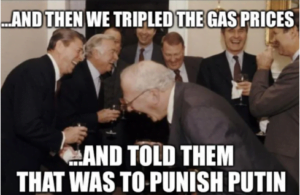
To conclude one must note an important statement uttered by the IMF:
“Winter 2022 will be challenging for Europe but winter 2023 will likely be worse.”
This echoes one of my statements in a blog dated 2021: “This year we are floating next year we will sink”. So in 2022 we are sinking but in 2023 we will be shipwrecked. We must embrace ourselves and when I say “we” I am not seeing up to my nose and referring to us Maltese and anyone residing in Malta but I am referring to the world nations in general. We might be in a better or a different situation but it does not mean that we close an eye to what other nations are going through. Since we are part of the world too we will feel some repercussions.
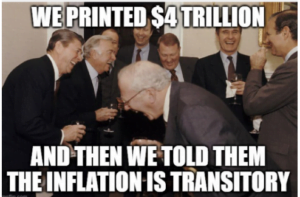
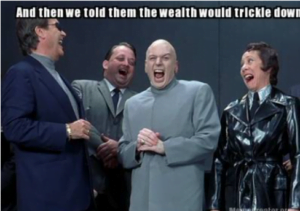
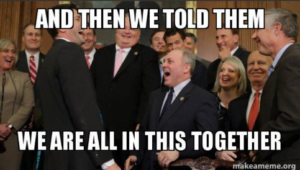
[1]https://www.cnbc.com/2022/10/11/imf-cuts-global-growth-forecast-for-2023-warns-worst-is-yet-to-come.html
[2]https://www.cnbc.com/2022/10/04/europe-made-a-mistake-with-russian-energy-now-it-needs-to-spend-big.html
[3]https://www.cnbc.com/2022/10/11/us-should-pump-more-oil-to-avert-war-level-energy-crisis-jpmorgans-jamie-dimon.html
[4]https://www.cnbc.com/2022/10/07/the-kremlin-behaved-like-a-drug-dealer-over-gas-supplies-polish-pm-says.html

